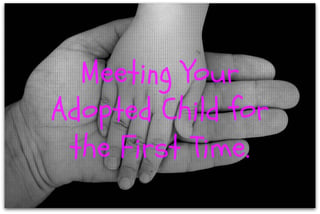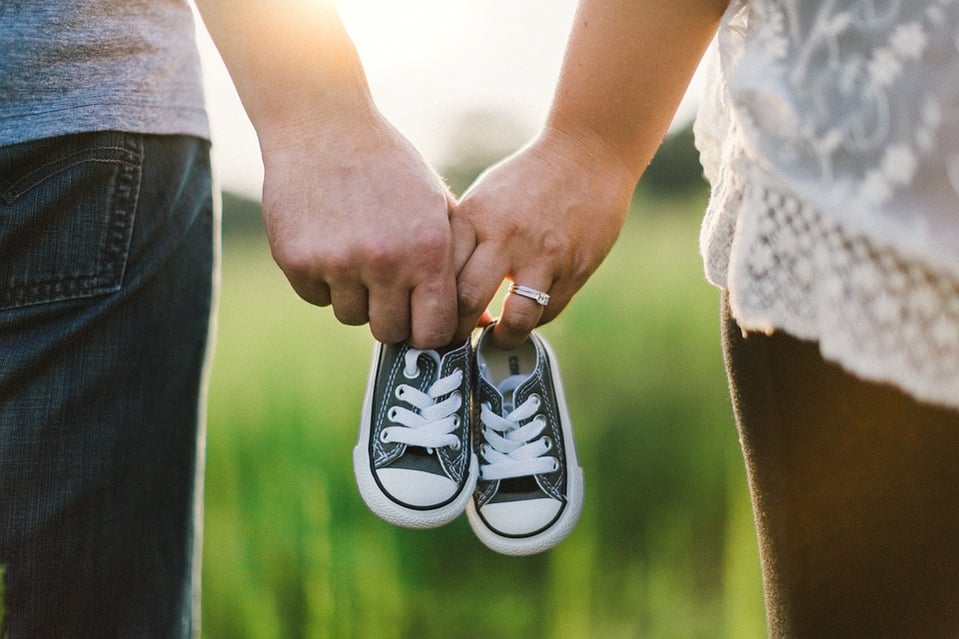 It is the day you have been waiting for, the time you will meet your adopted child for the first time. You have worked your way through the sea of paperwork that is international adoption with this very day in mind. How will this day go? What will happen? How will this child react to meeting you? These questions are now streaming through your mind.
It is the day you have been waiting for, the time you will meet your adopted child for the first time. You have worked your way through the sea of paperwork that is international adoption with this very day in mind. How will this day go? What will happen? How will this child react to meeting you? These questions are now streaming through your mind.
You feel joy as you envision this day but you also may feel other very different emotions such as:
- Anxiety
- Uncertainty
- Fear
- Worry
- Grief
If you are feeling this flood of emotions from the thought of meeting your child, imagine what the child must be feeling. Your child is losing the only home, caregivers, food, language and country they have ever known. They are meeting someone who looks, smells and talks funny, who may even be crying tears of joy.
Your adopted child may be feeling:
- Confused
- Frightened
- Worried
- Sad
- Anxious
- Disoriented
- Overwhelmed
- Grief stricken over the immense loss they are feeling
As an adult this moment can be emotionally difficult. For a child, this can be emotionally distressing. Much of these feelings seem to have a negative tone, but it should not be seen that way. This child is now going to have a forever family, they will have a family to love and care for them. The first few days may be overwhelming, confusing and full of adjustments for all of you. Every child experiences this first meeting differently.
Coping Mechanisms - Three Emotional Responses
A child going through this life changing experience may react in one of three ways to this stressful situation:
- Falling in Love you and your child melt into each others arms and feel instantly bonded. There are a few families that have this experience, but most do not. You have to remember that the process of bonding occurs over time through trust, security, and care between the child and parents.
- Fight and/or Flight– a child may cry and cannot be consoled, they may push away from you, and may even kick their feet in an effort to express their emotional unrest. These children may struggle to get away from their stressful situation and want to escape because they are overwhelmed with emotion. They may try to crawl away, push away, or wander from their new parents. They may sit away from them in an effort to avoid contact with them. They are experiencing emotions and events that they may have never felt before.
- Freeze– a child may be so distraught by emotions and the experience overall that they shut down and become emotionally unresponsive. They may avoid eye contact, not respond to toys, withdraw, and even sleep most of the time.
All of these are normal coping mechanisms for children in a very difficult emotional situation. Each child is different and the length of time they use one of these coping mechanisms to deal with their situation will vary. An older child will typically take longer to work through their emotions and their reaction may be stronger.
There are many factors that can play into the the coping mechanisms your child uses:
- Age of the child
- Health of the child
- Length of time in non-family care
- Strength of the bond with the caregivers
- Personality of the child
- Temperament of the child
- Developmental abilities of the child
- Past abuse or neglect
These behaviors will typically dissipate within 24 to 48 hours of meeting your child. You will then begin to discover your child's individual personality. These first few moments of meeting and even the hours following will be emotionally exhausting.
Coping and Building Trust
How can you help make this transition easier for your child?
- Put yourself in your child's place. Try to be understanding of the reasons for their emotions and respect the way they are coping with this life changing event.
- Listen to your child and take cues from them.
- Nurture them through play. For infants a simple game of peek-a-boo, singing a lullaby or looking at picture books together helps the child learn you are there for them.
- Feed them on time and when they are hungry. This will encourage them to trust in your love and care.
- Spend time together. Whether you are taking a walk through the park, playing on the playground, or coloring pictures, this is time your child needs to work through their emotions and you can both learn more about each other.
Remember that one of the best ways for you to help your child is to be aware of the normal or typical transition behaviors. There are many resources available to help you understand this emotional process of bonding with your newly adopted child. You will also experience a mix of emotions, and having realistic expectations of this first meeting, the days that follow and your child’s reaction will help both you and your child. Project positive feelings about your abilities and confidence in your choices regardless of your child’s reaction, choose to enjoy these special moments together. Support from family, friends and those you may be traveling with can help you cope with the emotions of this special time. Allow them to fix your meals, clean your home, whatever they can do to support you. Take lots of pictures and rest when your child is resting.
Family Connections, Inc. is an authorized New York State adoption agency, who offers a full range of adoption services for dual parent and single parent households adopting internationally. We would be glad to meet with you to discuss your adoption options. You can talk with an adoption professionals from Family Connections, Inc. by calling 607-756-6574 or 1-800-535-5556 to speak with Anita or Renee. You can download a free International Adoption Guide by clicking on the link below.




Let Us Know What You Thought about this Post.
Put your Comment Below.